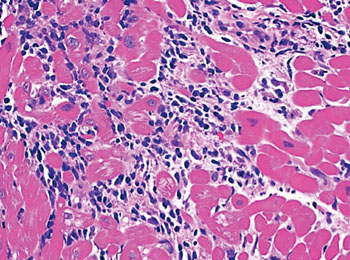Utility and Performance of Heart Transplant Test Confirmed
By LabMedica International staff writers
Posted on 25 Jun 2015
An innovative molecular blood test has been used following a heart transplant procedure and this test enables routine, noninvasive surveillance of acute cellular rejection, thereby assisting clinicians in the care and management of patients.Posted on 25 Jun 2015
New uses of the test have been described, specifically, the combination of the test with the measure of donor-specific cell-free DNA which improves the performance of the test, or an analysis of correlations between test scores and long-term outcome for patients, which could give a new predictive role to the test.

Image: Histopathology of interstitial edema in a cardiac transplant biopsy may be a sign of antibody-mediated rejection (Photo courtesy of the Society for Cardiovascular Pathology).
In the Cardiac Allograft Rejection Gene Expression Observational II (CARGO II) prospective, observational, multicenter clinical study blood samples for testing were collected during post-transplant surveillance visits, beginning at least 55 days after heart transplantation, with or without cardiac biopsy. After analyzing the samples, the test result was provided as a unique score ranging from 0 to 40, with high values indicating a greater risk of acute cellular rejection.
Moderate to severe acute cellular rejection (i.e., histopathology analysis of biopsies showing a grade greater than or equal to 3A according to the International Society for Heart and Lung Transplantation grading system) were reported by pathologists in 106 out of 3,324 biopsies (3.2%), in 79 out of 594 patients (13.0%). Taking into account these observations, the study shows that the negative predictive value of AlloMap (DIAXONHIT; Paris, France) is greater or equal to 99.0% for AlloMap scores less than 34. This threshold is therefore associated with a low risk of moderate to severe acute cellular heart graft rejection.
Loïc Maurel, MD, President of the Management Board of DIAXONHIT, said, “With a central laboratory becoming operational soon in Strasbourg, France, DIAXONHIT will be able to duplicate the testing practice already conducted by CareDx (Brisbane, CA, USA) in the US, and provide AlloMap testing to European patients for whom the performance of the test was confirmed in the CARGO II study. The results that were presented during the second joint symposium at this year’s International Society for Heart and Lung Transplantation congress organized by DIAXONHIT and CareDx are quite encouraging, as they confirm a more routine use of the test in several US centers and already present potential new uses of AlloMap that should further benefit heart transplant patients.”
Related Links:
DIAXONHIT
CareDx













